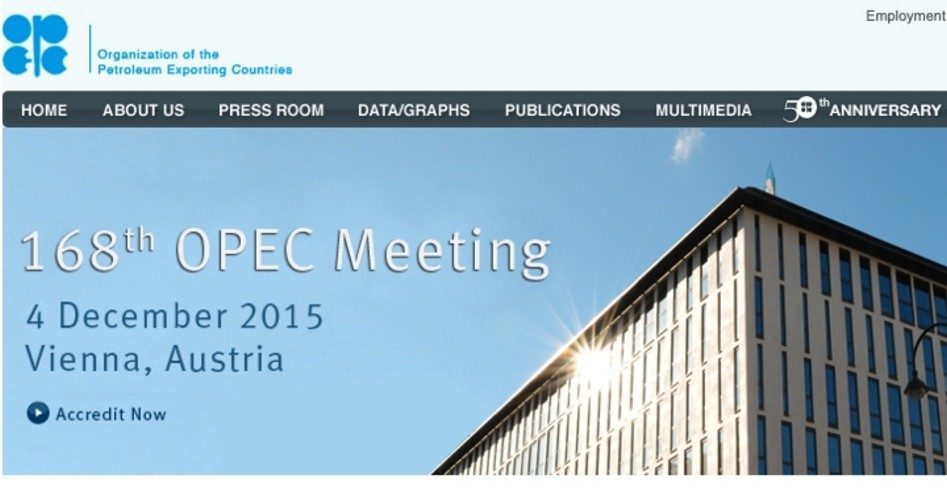
According to the International Energy Agency (IEA), the slowing in the demand for crude oil worldwide, coupled with more-than-abundant supply, bodes ill for higher prices for oil for at least the next year, if not longer. This is bad news for OPEC countries that need much higher oil prices to stay solvent.
The IEA predicted in its report last week that not only is demand growth slowing by at least one-third, year-over-year, “recent downgrades to the macro-economic outlook are also filtering through.”
A brief look at that “macro-economic outlook” — i.e., the global economy — reveals various red flags warning of a global slowdown that will continue to pressure OPEC.
In its latest World Economic Outlook, the International Monetary Fund (IMF) cut its 2016 estimate for world growth, thanks to continuing economic declines in Canada, Brazil, Venezuela, Russia, and Saudi Arabia.
The Cass Freight Index, which measures the levels of global shipment activity from hundreds of its clients from a broad spectrum of industries, showed a drop of 1.5 percent in September compared to last year, which was the worst September since 2010. The Institute for Supply Management’s September PMI (Purchasing Managers’ Index) fell by 6.2 percent, the third month in a row for that index, reflecting a 12-percent decline in new orders.
British banking behemoth HSBC just reported that global GDP (gross domestic product) has fallen 3.4 percent so far this year, while global trade has cratered by 8.4 percent. Exports from China in September were down 3.7 percent compared to a year ago, while imports into China dropped 13.8 percent in August, followed by another 20.4 percent decline in September.
Leading companies such as McDonald’s and Caterpillar are struggling as well, thanks to the global slowdown. The remarks from McDonald’s new CEO, Steve Easterbrook, to his franchisees at a summit in May reflected much more than just a modest readjustment to a changing environment, but a massive overhaul that some understood to be necessary for the company’s very survival. Said Easterbrook: “Our recent performance has been poor. The numbers don’t lie. I will not shy away from the urgent need to reset this business.”
McDonald’s same-store sales have fallen for six straight quarters — that’s 18 months — with its franchisees raising existential questions following that summit. The franchisees’ six-month outlook for the company’s U.S. business was the worst in more than 11 years of surveys.
Caterpillar, the world’s leading manufacturing of construction and mining equipment, diesel engines, gas turbines, and diesel-electric locomotives, saw its profits drop from $1 billion in the third quarter a year ago, to just $368 million in September. That’s a 70-percent drop, resulting in the company cutting sharply and announcing the layoff of thousands of its workers.
With slackening demand and continuing oversupply, the price of crude will remain low for the foreseeable future, putting pressure on OPEC countries such as Saudi Arabia, Algeria, Iran, Kuwait, and Venezuela. For example, Kuwait needs oil priced at $54 a barrel to balance its 2015 budget, while Nigeria needs $122 a barrel. Iran and Algeria need oil to be at $131 a barrel, while Venezuela needs oil at $160 a barrel to balance its 2015 budget.
For Saudi Arabia, its break-even point is $106 a barrel, according to the Belfer Center at Harvard University. Altogether, if oil prices don’t rebound sharply, and soon, the IMF predicts that Saudi Arabia and its fellow Middle Eastern oil exporters will suffer a combined budget shortfall of $1 trillion over the next five years.
It’s a perfect storm that OPEC never envisioned. From its myopic viewpoint, supply should have shriveled, and demand improved, to the point where it would have begun to show a profit long before now. It had hoped that supply from the United States would have started to drop precipitously, that demand from China and elsewhere would have continued to support higher prices, and that its position as leader of the OPEC cartel would be assured.
But just this week Bloomberg reported that Saudi Arabia is delaying payments to government contractors as slumping oil prices have pushed the country into deficit for the first time since 2009.
A graduate of an Ivy League school and a former investment advisor, Bob is a regular contributor to The New American magazine and blogs frequently at www.LightFromTheRight.com, primarily on economics and politics. He can be reached at [email protected].



